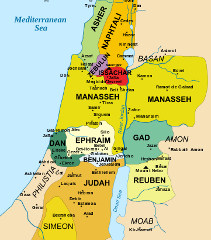There Are No Lost Tribes
Paul the Apostle was from the tribe of Benjamin. In Luke 2:36a, we read about a widow named Anna who prophesied about the infant Jesus. “There was also a prophet, Anna, the daughter of Penuel, of the tribe of Asher.” The priests were from the tribe of Levi. The largest of all the tribes, however, was the tribe of Judah. We see these particular tribes mentioned in the New Testament (obviously excluding Revelation 7, where all the tribes are mentioned except Dan).
Discussion
The Ten Tribes of Israel: Were They Lost?

Read Part 1.
A detailed refutation of the various explanations of Israel’s northern tribes is impossible within this format. The great Hebrew Christian scholar, David Baron, in his work The History of the Ten “Lost” Tribes has provided the most detailed and accurate answer to the question. The following is a summary of his main points with a few personal observations. The fallacy inherent in all of the theories is simply this: the tribes were never lost, but continued as part of the main body of the Jewish people. Consider the following five points:
1. At the time of the disruption of the united kingdom in 930 B.C., faithful Israelites from all the northern tribes joined their brethren in the south and continued their identity as part of the kingdom of Judah. Two books in Scripture that are strangely ignored by British-Israelites are 1 and 2 Chronicles. These books make it clear that the tribes in the north continued their existence as part of Judah after 930 B.C. Consider 2 Chr 11:14, 16: “For the Levites left their suburban lands and their possession, and came to Judah and Jerusalem; for Jeroboam and his sons had cast them off from executing the priest’s office unto the LORD; …. And after them, out of all the tribes of Israel, such as set their hearts to seek the LORD God of Israel came to Jerusalem, to sacrifice unto the LORD God of their fathers.” These verses provide irrefutable proof that many godly individuals out of “all the tribes of Israel” rejected Jereboam’s idolatry and joined the southern kingdom. During the reign of Asa, others followed from Ephraim and Manasseh (2 Chr. 15:9). Thus, it is evident that the kingdom of Judah absorbed many from the northern kingdom through the years.
Discussion
The Ten Tribes of Israel: Lost or Found?

In December, 1984, astounding news leaked to the world press. For over a year, the Israeli government had been secretly flying over ten thousand Ethiopian Jews out of their refugee camps in the Sudan to their new homes in the modern state of Israel. The Beta Israel, as they call themselves (Falashas in the Ethiopian language), claim that their Judaic faith originated after the Queen of Sheba returned from her famous visit to King Solomon, bringing with her the knowledge of the one true God. Rabbis in Israel, however, had another explanation—these Ethiopian Jews were descendants of the tribe of Dan, one of the mysterious lost tribes of Israel.
Occasionally an article will describe the Jewish customs of the Pashtu—an Islamic tribe in Afghanistan. They circumcise their sons on the eighth day, wear four-cornered garments, perform levirate marriages and wear traditional sidelocks and beards. These customs have convinced some researchers that the Pashtu tribe is a remnant of the ten lost tribes of Israel.
A prominent American radio and TV “evangelist” proclaimed for years that the ten lost tribes were not lost but had reappeared as the British and American peoples, whom, he claimed, were the inheritors of the promises to ancient Israel! These various ideas appearing in the twentieth century have again raised some important questions in the minds of many: what did happen to the ten tribes? Have some of them survived until today? Can we identify these tribes with any of the many ethnic groups living on planet Earth today? This post attempts to answer these and other questions by sifting through the myths and ideas of men to ascertain the scriptural and historical truth about the so-called lost tribes.


Discussion